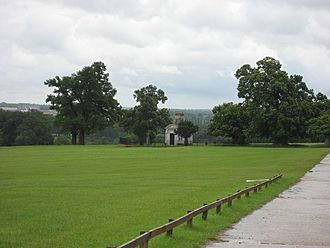Lytton Mausoleum facts for kids

The mausoleum in 2007
|
|
Quick facts for kids General information |
|
|---|---|
| Architectural style | Neoclassical |
| Country | England |
|
Listed Building – Grade II
|
|
| Official name: Lytton Mausoleum in Knebworth Park, including railings | |
| Designated: | 1968 |
| Reference #: | 1174579 |
| Client | Elizabeth Bulwer-Lytton |
| Technical details | |
| Structural system | stone |
| Design and construction | |
| Architect | John Buonarotti Papworth |
The Lytton Mausoleum is a special building in Knebworth Park, Hertfordshire, England. It is a family mausoleum, which is a grand building used as a burial place. This mausoleum was built for the Lytton family, who lived at nearby Knebworth House.
About the Mausoleum
The Lytton Mausoleum was built in 1817. It was ordered by Elizabeth Bulwer-Lytton to honor her parents. Their names were Richard Warburton-Lytton and Elizabeth (née Jodrell). They were important members of the family who owned Knebworth House.
The mausoleum is located in the beautiful parkland of Knebworth. It is a short distance from the Church of St Mary and St Thomas. Before this mausoleum was built, the Lytton family used a chapel at St Mary's church for burials. This chapel was rebuilt around 1710. It holds three amazing monuments dedicated to family members.
Who is Buried Here?
Inside the Lytton Mausoleum, you can find several coffins. One of them belongs to Elizabeth Bulwer-Lytton (1770–1843). She was the person who had the mausoleum built.
There is also a special casket holding the ashes of Lady Constance Bulwer-Lytton (1869–1923). Lady Constance was a brave woman who joined the suffragette movement. This movement worked to get women the right to vote. Her epitaph, which is an inscription on her tomb, says she "sacrificed her health and talents in helping to bring victory to this cause." This means she worked very hard for women's voting rights.
Design and History
The Lytton Mausoleum was designed by an architect named John Buonarotti Papworth. He created an octagonal, or eight-sided, building made of stone. Its design is in the Neoclassical style. This style uses ideas from ancient Greek and Roman buildings.
The roof of the mausoleum holds a sarcophagus. A sarcophagus is a stone coffin. It has shell-shaped decorations called acroteria on top. The building and the railings around it are considered historically important. They were given a Grade II listed status in 1968. This means they are protected because of their special history and architecture.
 | William M. Jackson |
 | Juan E. Gilbert |
 | Neil deGrasse Tyson |

